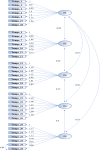Validation of the Arabic version of the 35-item TEMPS-M in a community sample of adults
- PMID: 36709317
- PMCID: PMC9883938
- DOI: 10.1186/s40359-023-01064-y
Validation of the Arabic version of the 35-item TEMPS-M in a community sample of adults
Abstract
Background: To our knowledge, no brief version of the Temperament Evaluation in Memphis Pisa and San Diego (TEMPS-M) is available so far in the Arabic language, which might have resulted in limited research in this field from Arab countries. We aimed through this study to validate the 35-item TEMPS-M into the Arabic language in a sample of non-clinical Lebanese adults.
Methods: We used an online cross-sectional survey targeting non-clinical Lebanese adults from the general population. A confirmatory factor analysis was conducted to test the factorial structure of the TEMPS-M.
Results: All five temperament subscales achieved good/very good internal consistencies in the present study (depressive: α = 0.78, cyclothymic: α = 0.86, hyperthymic: α = 0.83, irritable: α = 0.87, and anxious: α = 0.87). The five-factor solution of the TEMPS-M displayed a good CFI of 0.94, TLI of .94 and a GFI of .95, but a poor RMSEA of .10 [90% CI .10, .11]. The five affective temperaments showed positive correlations with personality dysfunction domains, thus attesting for convergent validity. In addition, positive correlations between all affective temperament dimensions and anxiety/depression scores were found. We also tested for gender invariance, and found that configural, metric, and scalar invariance were supported across gender.
Conclusion: Our data suggest that the psychometric properties of the Arabic TEMPS-M are good. Making this scale available in Arabic will hopefully encourage Arab researchers to investigate this under-explored topic in their countries, and advance knowledge on how culture impacts the prevalence, development and course of temperament.
Keywords: Affective temperament; Arabic; Confirmatory factor analysis; TEMPS-M; Validation.
© 2023. The Author(s).
Conflict of interest statement
The authors have nothing to disclose.
Figures
References
-
- Kagan J. Galen’s prophecy: temperament in human nature. Boulder: Westview Press; 1994. p. 376.
-
- Akiskal HS, Akiskal KK. In search of Aristotle: temperament, human nature, melancholia, creativity and eminence. J Affect Disord. 2007;100(1–3):1–6. - PubMed
-
- Psychiatrie KE. Ein Lehrbuch für Studierende und Ärzte. Leipzig: J.A. Barth; 1913.
-
- Schneider K. Psychopathic personalities [Internet]. Springfield, Ill.: C.C. Thomas; 1958 [cited 2022 Jun 10]. Available from: http://books.google.com/books?id=miZsAAAAMAAJ
-
- Eysenck HJ, Eysenck SBG. A factorial study of an interview-questionnaire. J Clin Psychol. 1962;18(3):286–290. - PubMed
MeSH terms
LinkOut - more resources
Full Text Sources
Medical
Miscellaneous


